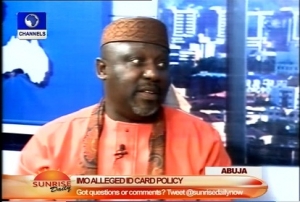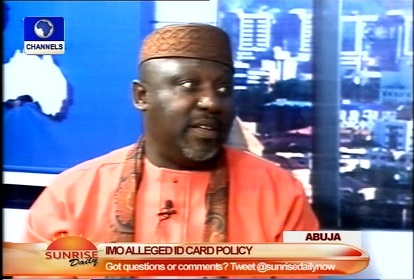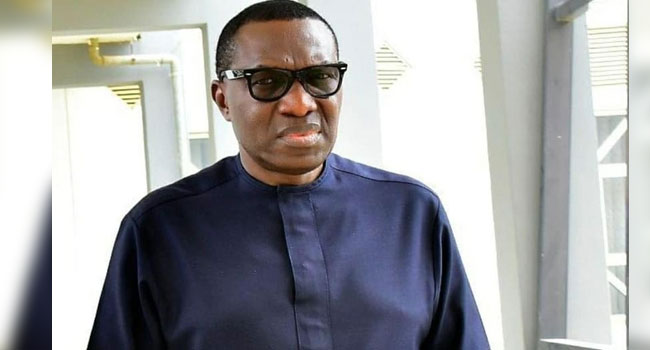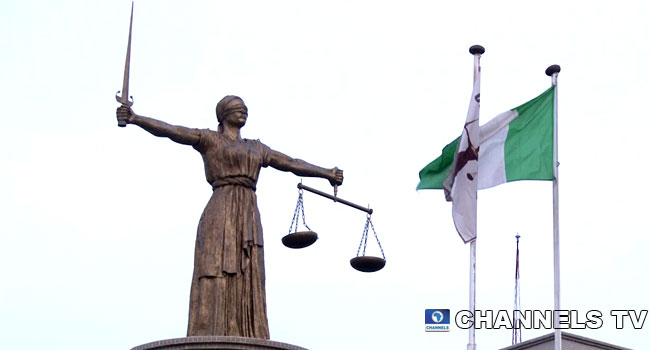
The Governor, who berated the Senate for discussing the issue, explained that the said registration came to him as a surprise. He argued that “you just don’t talk on something that doesn’t exist” insisting that “there is nothing of that sort”.
He, however, noted, “my pains lies in the fact that my Senate could not place a call to a sitting governor, to find out whether this allegation is right or wrong; and the allegation came from nowhere.
While speaking on Wednesday’s, July 9, edition of Channels Television’s Sunrise Daily, the Governor said “The Hausa Community have come out to say it is not true; in fact they are living peacefully with us”, adding that “the same people that accuse me of bringing Boko Haram, are the same people accusing me of registering northerners.”
He further berated the Senate for dwelling on rumours rather than discussing real issues like “the bomb scare” that occurred in the state, adding that “the Federal Government knows that people are living in almost a death trap, coming from Port Harcourt to Owerri (Expressway); the end part of Port Harcourt, which they have abandoned” alleging that “no one has cared to put that at the floor of the Senate”.
He also accused the Senate of only trying to “run somebody down” instead of debating on the lack of Federal Government’s presence in the state
“There is no single Federal Government presence in Imo State and there is none of these Senators that will talk about it, their only achievement is to run somebody down; I don’t know what will be the profit, I don’t know what will be the gain”, he said.
The former presidential candidate went ahead to list a plethora of what he described as ‘Dirty Politics Chapter 1 Verse 1’ that has been put in place by his political detractors to “intimidate and oppress somebody for no just cause” including the embarrassing snatching of the microphone while he was speaking during the burial of Justice Chukwudifu Oputa.
He praised the efforts of the Senator representing Anambra South Senatorial District, Andy Uba, who cautioned the Senate to investigate the alleged registration, wondering why the Senate would “kill a man before you hear from him”.
He, however, noted that the problem began when he launched a ‘Know Your Neighbour Programme’ after a bomb was defused within the premises of a church. He explained that the launch was graced by security agents in the state, where decision were reached to safeguard the state from the recent security challenges facing the country.
The Governor also said that the problem with Nigeria was that it had focused on “fighting crime” rather than “crime prevention”, explaining that “fighting crime is very expensive” and that one of such crime prevention programmes, Community Government Council (CGC), has helped to stop the 12 year old kidnapping menace in the state.
He called on Nigerians to ask questions when a stranger appears in their communities or when the status of residents change without a source of income to show.
Mr Okorocha maintained, “Security is not a Government responsibility alone, as you cannot achieve a perfect security if you do not get the people involved”. He insisted that “security is about the people by the people and for the people; Government should only guide.”
The Senate had, during the first week of July, waded into the controversy involving the Imo State Government’s alleged plan to register northerners in the state. Lawmakers, including the representatives of the state’s senatorial district vehemently condemned the plan, even lawmakers from Imo State.
But the Imo State Governor, Rochas Okorochas, has repeatedly denied reports of plans to issue identity cards to Northerners resident in the state, describing it as false.
Governor Okorocha claimed that Northerners have enjoyed long standing hospitality in Imo State and blamed those desperate for power as being behind the attempt to damage the cordial relationship between indigenous people of the state and the Hausa community.



